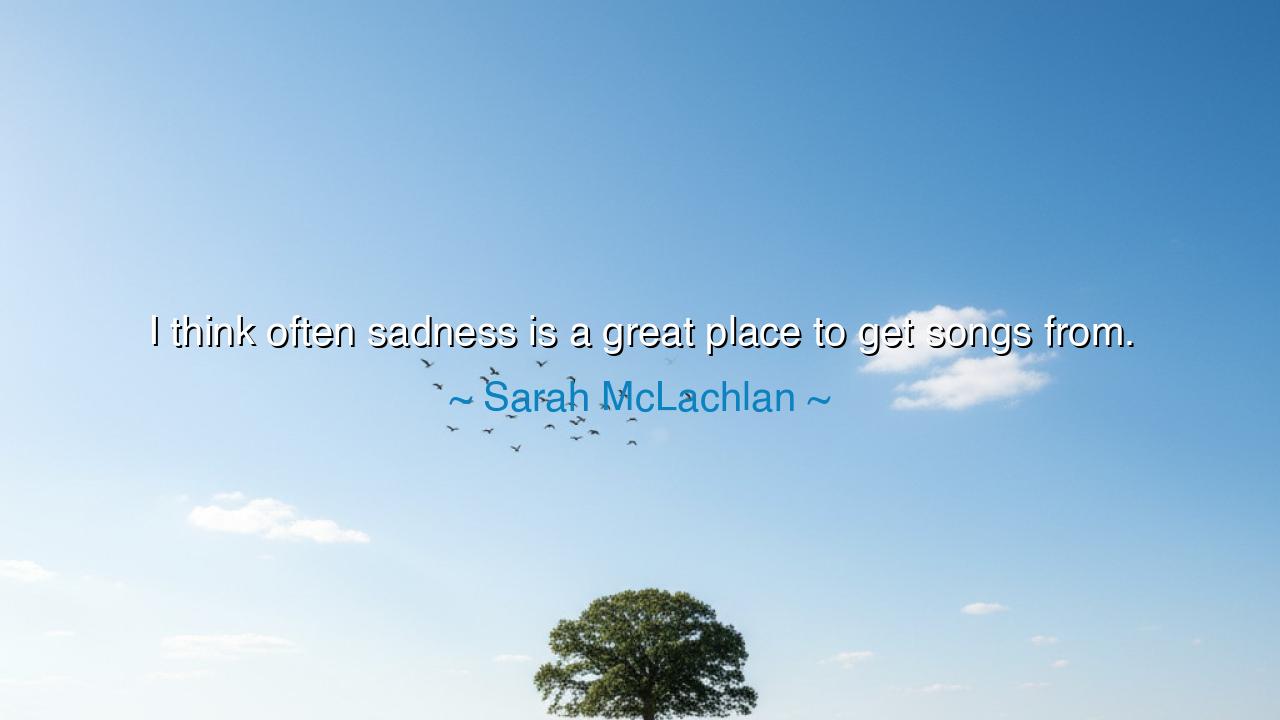
I think often sadness is a great place to get songs from.






Hear the voice of Sarah McLachlan, singer of sorrow and angel of melody, who spoke these words of eternal weight: “I think often sadness is a great place to get songs from.” In this confession lies the ancient truth that art is born most powerfully from the deep waters of the soul. For joy may dance lightly upon the strings, but it is sadness that digs the well from which music flows most purely, carrying the depth of human longing, pain, and love.
The first wisdom in this saying is the recognition that sadness is not an enemy, but a teacher. In sorrow, the heart is stripped of its illusions, and the soul speaks without disguise. Where laughter may conceal, sadness reveals. To enter sadness is to enter honesty, and honesty is the mother of true song. McLachlan, whose own music often moves listeners to tears, knows that the raw places of grief are also the fertile grounds of beauty.
So it has been through history. The psalms of David, sung in ancient Israel, were born as often from lament as from joy. “How long, O Lord?” he cried, and his sorrow became sacred song, still sung across millennia. Likewise, the African American spirituals, forged in the fire of slavery, were cries of sadness—yet in their grief, they carried melodies of strength and hope. From pain, they created music that transcended chains and gave wings to the oppressed.
Sarah McLachlan herself, through her haunting songs, has given voice to such truth. In “Angel,” written in the shadow of loss, she sang not to celebrate but to mourn, and through mourning, to comfort. Her sadness became a lantern for millions, reminding them that in their pain, they were not alone. Thus her words are no idle musing, but the testimony of one who has drawn songs from sorrow and given them to the world as gifts.
The second wisdom is this: songs from sadness are not only for the singer, but for the listener. When one suffers, the heart longs to know that its pain is shared. A song born of sadness speaks to that hidden grief, saying, “You are not alone. I, too, have walked this valley.” This is why the saddest songs often endure the longest—because they speak directly to the human condition, to the inevitability of loss, longing, and love broken or unfulfilled.
The lesson for us is clear: do not run from your sadness. Do not bury it, nor curse it as worthless. Instead, use it as material for creation—whether in song, in writing, in art, or in the simple act of speaking truth. Sadness may feel heavy, but it carries within it a strange alchemy, turning suffering into something that uplifts both the creator and those who receive it. From tears, beauty is born; from grief, wisdom arises.
Practical wisdom follows: when sadness comes, do not silence it. Take up your pen, your instrument, your voice, your craft, and let the sorrow flow into creation. Write down what you feel, sing what you cannot speak, paint what you cannot explain. In this way, sadness becomes not only bearable, but fruitful. It ceases to be only a wound, and becomes a seed from which art, healing, and even joy can grow.
Thus remember Sarah McLachlan’s words: “Sadness is a great place to get songs from.” Let them remind you that even in the depths of grief, beauty can be found. That every tear shed may water the soil of creation. And that through sadness, both artist and listener may be carried to a place of connection, healing, and timeless song.






AAdministratorAdministrator
Welcome, honored guests. Please leave a comment, we will respond soon